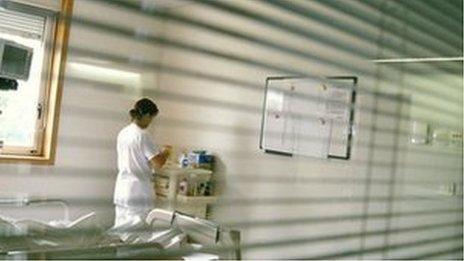Wales NHS election battle over mortality rates 'nothing new'
- Published

High mortality rates at Welsh hospitals have been criticised
Those with long memories will know that election battles over the NHS are nothing new.
The 1992 General Election campaign was briefly but bitterly taken over by the so-called War of Jennifer's Ear - essentially a row between Labour and the Conservatives over whether NHS waiting lists were too long and whether there should be tax breaks for those seeking private treatment.
Then as now, a dispute over one health story quickly became a much wider political row over how the NHS should be run and what their parties' respective policies said about their fitness to run the country.
There are parallels with this week's row over mortality figures in Welsh hospitals.
What started as an innocuous-sounding email from the medical director of the English NHS to his Welsh counterpart - merely suggesting that some statistics might be worth looking at more closely - has exposed some of the fault-lines for next year's general election.
Wales' Health Minister Mark Drakeford said he's "coldly furious" that data on mortality rates in Welsh hospitals are being used for political advantage.
To be fair to the Welsh government, it can't be accused of covering up the figures - which are publicly available - and there has been an improvement in the latest set of results.
But the difference in performance between the Welsh NHS and the service in England - even allowing for differences in the way statistics are collected - has come to dominate political debate.
The Conservatives in Westminster think it is clear enough - Labour has mismanaged the NHS in Wales, and voters should think twice before voting Labour in the General Election in case the party does the same in England.
- Published21 February 2014
- Published20 February 2014
- Published20 February 2014